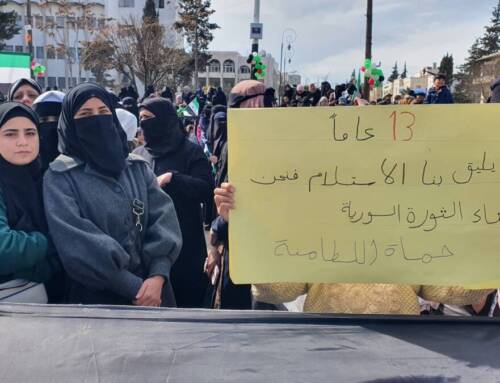Syria Situation Report: September 8 – September 22, 2016
Welcome to the latest installment of the Syria SITREP highlighting […]
22 September 2016
Welcome to the latest installment of the Syria SITREP highlighting key developments in the Syrian Civil War. The SITREP Map is made possible through a partnership between the Institute for the Study of War and Syria Direct. To download the SITREP Map as a PDF, see below. Here’s what happened in Syria this week:
1 September 12: Regime Fires Anti-Aircraft Missiles at Israeli Fighter Jets: Regime forces fired two surface-to-air missiles at Israeli Defense Forces (IDF) aircraft over southern Syria after Israel conducted airstrikes targeting regime artillery positions in Quneitra and outer Damascus Provinces in response to shells that struck the Golan Heights on September 12. The Syrian Arab Army claimed that the missiles downed a fighter jet and an unmanned aerial vehicle. The IDF confirmed the incident but denied that the missiles had posed any threat to its aircraft.
2 September 22: Limited Evacuation of Al-Wa’er District of Homs City: The Syrian Arab Red Crescent evacuated roughly one hundred opposition fighter, their families, and personal weapons from the besieged Al-Wa’er District of Homs City to northern Homs Province in preparation for a future transfer to Idlib Province. The withdrawal comes after the postponement of a similar evacuation on September 19 after the UN refused to facilitate the transfer. The evacuation comes as part of a normalization deal to bring Al-Wa‘er District back under regime authority in exchange for an end to the three-year-long siege of its estimated 75,000 residents.
3 September 20: US Names Jund al-Aqsa a Terrorist Organization: The US State Department designated Salafi-Jihadist group Jund al-Aqsa a Specially Designated Global Terrorist (SDGT) entity, imposing sanctions on the group for its “significant risk” of “committing acts of terrorism” that threaten the US or its interests. The statement noted that Jund al-Aqsa formed in 2012 as a sub-unit of former Syrian Al-Qaeda affiliate Jabhat al-Nusra. Jund al-Aqsa operates primarily in Idlib and Hama Provinces, where the group has spearheaded an offensive against Hama City that began in August 2016.
4 September 17: Jabhat Fatah al-Sham Leader Gives Interview: Jabhat Fatah al-Sham Emir Abu Mohammad al-Joulani condemned the nationwide ‘cessation of hostilities’ during an interview on Al-Jazeera, stressing that deal reached between the US and Russia over Syria aims to impose a “political solution that would result in the complete surrender” of opposition forces. Joulani stated that negotiations for a ‘grand merger’ of opposition factions have reached an “advanced consultative stage”. Joulani also stressed that all opposition factions have agreed to “do everything possible” to lift the siege of Aleppo City and seize Hama City in the “coming days”.
5 September 19: Warplanes Strike UN Humanitarian Convoy: Suspected pro-regime warplanes targeted a humanitarian aid convoy run by the UN and Syrian Arab Red Crescent in the opposition-held town of Urum al-Kubra near Aleppo City, killing at least twenty aid workers. The UN, Red Cross, and other aid groups announced the indefinite suspension of all humanitarian convoys in response to the attack, although aid deliveries largely resumed by September 22. Top US officials placed responsibility for the attack on Russia, while Russia and Syria denied any involvement in the airstrike.
September 22: Regime Announces Start of Operations in Eastern Aleppo City: The Syrian Arab Army declared the start of military operations to seize the opposition-held districts of eastern Aleppo City. Regime forces called upon residents to distance themselves from “terrorist groups” and offered shelter for those who “return to the motherland”. The announcement follows the breakdown of a nationwide ceasefire that lasted from September 12 to September 19.
7 September 16: Opposition Groups Expel US Special Operations Forces from Al-Rai: Approximately 40 US Special Operations Forces deployed to Al-Rai in northern Aleppo Province in support of opposition groups fighting against IS with the support of the Turkish Armed Forces as part of Operation Euphrates Shield. US forces withdrew after Ahrar al-Sharqiya and other Free Syrian Army-affiliated opposition groups protested against their presence, citing US support for the “separatist gangs” of the Syrian-Kurdish YPG. Both Ahrar al-Sharqiya and Liwa Suqour al-Jabal later declared their withdrawal from Operation Euphrates Shield.
8 September 19 – 22: Turkey Announces Operations to Seize Al-Bab: Turkish President Recep Erdogan stated that the next phase of Operation Euphrates Shield will target the IS-held town of Al-Bab in northern Aleppo Province, noting that opposition forces backed by the Turkish Armed Forces could clear a ‘safe zone’ of up to 5,000 square kilometers. IS launched a major counter-attack against opposition forces participating in Operation Euphrates Shield on September 20, recapturing at least eleven villages following heavy clashes that included at least one suicide vest.
9 September 20 – 22: Turkey Floats Participation in Operations Against A-Raqqa City: Turkish President Recep Erdogan stated that Turkey will cooperate with the US in operations against the IS stronghold of Raqqa City, noting that Turkey will “not act unilaterally” to seize the city. Turkish Presidential spokesperson Ibrahim Kalin later clarified that that Turkey would not participate in the offensive if it included the Syrian-Kurdish YPG. The statements come after a meeting between US Secretary of Defense Ash Carter and Turkish Minister of Defense Fikri Isik on September 8, in which Isik insisted that the “core” component seizing the city must be composed of the “local people of the region” rather than the YPG.
10 September 17: Coalition Airstrike Reportedly Hits Pro-Regime Fighters in Eastern Syria: US CENTCOM released a statement confirming that coalition aircraft may have “mistakenly struck” pro-regime forces while conducting operations against IS near Deir ez-Zour City, stressing that the coalition would not “intentionally strike” the regime. Britain, Australia, and Denmark also confirmed their involvement in the incident. Russia and Syria claimed that the attack was “deliberate” and enabled advances by IS. Russia called an emergency session of the UN Security Council over the incident.
Click HERE to view the PDF.








